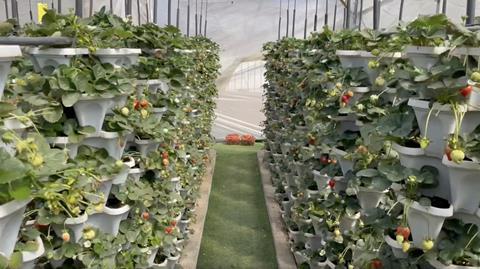Founder of the first vertical strawberry farm in Palestine, Ayed Awni Aburamadan has a history of success in the face of overwhelming challenges, and he is determined to rebuild when the war is over
Ayed Awni Aburamadan is a Palestinian engineer who developed his family farm outside the city of Beit Hanoun in northern Gaza, producing non-traditional fruits and vegetables for the area including tropicals like dragon fruit.
Despite the limitations imposed by the political situation in the region over the years, including Israel’s control over movements of goods and people to and from the Gaza Strip, Aburamadan says he has remained committed to sustainable farming methods, including employing renewable energy and reusing water and agricultural waste, and he has continued to progress with innovations such as vertical farming in order to maximise yields.
In fact, his site includes Palestine’s first vertical strawberry farm – a model of production that has apparently enabled him to reduce the amount of water, fertiliser and pesticides needed by around 90 per cent.

However, like hundreds of thousands of Gazans, Aburamadan has been forced to leave his home and farm due to the war in Gaza and head south, taking shelter in a small family home with family and friends.
“Our little place was meant for holidays only and was not equipped to host so many people for a long time,” he says. “But we managed to put up tents and build premature cooking facilities, relying on wood, as gas and electricity were cut off.”
Fresh food quickly became scarce in grocery stores, he reveals, soon running out completely. “Factories in Gaza are not working because there is no electricity, there are no raw materials and it is not safe,” he explains. “Some people maintained their farms in the south until a couple of weeks ago, so we had fresh tomatoes, cucumbers, aubergines, potatoes, bell peppers and citrus. Now, fresh products have become scarce. Food aid is not enough for the huge number of people. Even if you have the money, you can’t find the goods.”
Aburamadan has been unable to visit his farm in the north for over two months now, but he has learnt that it has sustained heavy damage. Whatever the scale, he intends to return and to rebuild.
Business has been incredibly difficult for farmers like Aburamadan, but it has also made them resolute. “In order to establish my modern farm I needed knowledge that was not available,” he says, “so I had to rely on the internet and trial and error methods to get my technical issues sorted out. I had to apply for security clearances from Israeli authorities to import some modern equipment to control the greenhouse environment. Marketing and exporting my products was also extremely expensive and difficult.
“I haven’t been able to assess the damage to the farm yet. It was also destroyed in previous years. When the war ends, and if I’m still alive, I will go back there to start again for the fifth time.”



